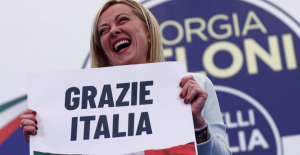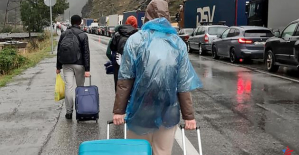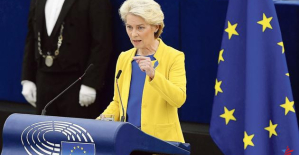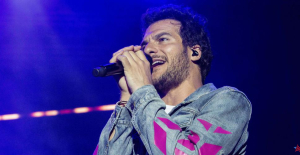Rome
It is an indisputable victory that the coalition of Italian rights won on Sunday in the parliamentary elections, driven by its neo-fascist and conservative component, Fratelli d'Italia. And by the personal success of its leader, Giorgia Meloni, 45. With 7.3 million votes (compared to 1.4 million in 2018), representing 26.4% of the votes cast, Giorgia Meloni alone won three times as many votes as each of her two great allies, and as many as the small left-wing coalition united around the Democratic Party.
Which PD, with 19% of the votes cast, suffered a historic failure, having received 820,000 votes less than Matteo Renzi in 2018, which was until now the lowest point of the party. In a little over four years, Giorgia Meloni has multiplied by five the number of his voters, winning them entirely over Matteo Salvini's League and Silvio Berlusconi's Forza Italia, which won only 8.9% and 8 respectively. .3% of votes.
With 44% of the vote, the coalition secures a large majority in the two assemblies: 237 deputies out of 400, and 112 senators out of 206, according to projections by the Ministry of the Interior. Without however achieving the control of two-thirds of the seats which would have allowed him to impose a presidential regime without going through a referendum, and which would have ensured him stability over five years. She will be able to govern as long as there is no possible alternative majority in Parliament.
"If it has won a clear institutional victory, these elections do not mean that all of Italy has swung to the far right", warns against any hasty interpretation the political scientist at Luiss, Giovanni Orsina. Because it is not a plebiscite: with less than 64% participation, the lowest level in the history of the Republic, only 28% of registered voters voted for the right, and less than 17% for Fratelli d 'Italy. And Giovanni Orsina to recall: “The right is today faced with a country that is mainly skeptical, and which is not ready to give it its confidence. So she should be careful."
Nevertheless, it is indeed a nationalist and sovereignist radical right that brings it to power. The expert in political sociology Jean-Yves Dormagen, who analyzed the “clusters” of the Italian electorate for the review Le Grand Continent, describes this coalition as “Trumpian”, nourished by “very anti-immigration workers, a bourgeoisie anti-assistantship, and many sectors in demand of protectionism and authority". Segments of the population who, to varying degrees, aspire to the affirmation of the Christian identity of Italy against multiculturalism, to the order and security, and are fiercely opposed to "work-diverting welfare".
While the center of the big Italian cities remained in the hands of the left or the center, Giorgia Meloni recovered the votes of the periphery, of the workers, craftsmen, merchants and small Italian bosses. And not only in the north-east of Italy, where it collected twice as many votes as the League, of which it is however the region of origin. It also won spectacular victories on the red soils of Tuscany and Emilia-Romagna.
Still, his score will not allow him to do without a single one of his allies. “Although she is the leader of the largest party of the radical right in Europe, she is not Viktor Orban, explains political scientist Roberto d’Alimonte. Even with about 30% of the elected, she will not have a free hand and will have to find compromises on each question with her allies. Allies whose weakness she also fears, both Salvini and Berlusconi, who, at 85, was elected in Monza and is making a comeback in the Senate. Because, says Giovanni Orsina, “a weak ally sooner or later turns out to be unstable and unpredictable”.
Initially, on the strength of her victory, Giorgia Meloni should be able to seize the levers: "It is she who should be called by the Quirinale to be the next president of the Council, she who will form the government with the agreement of the President of the Republic, and she who will set government policy,” says Giovanni Orsina. The formation of the government will also be a first test of its room for maneuver and its ability to block Matteo Salvini, who dreams of managing immigration again at the Ministry of the Interior. Lorenzo Castellani, from Luiss, predicts that "Giorgia Meloni will probably give more weight to his allies in his government than their electoral results, even if it means depriving his own party of a few seats, to get them to follow his political line”. But for how long? "There is no stable political coalition in Italy," replies Roberto d'Alimonte. Its longevity will largely depend on the international situation, which may make it easier or much more difficult for it.
SEE ALSO - Who makes up the union of Italian rights? The explanation of the Italian journalist Matteo Ghisalberti










